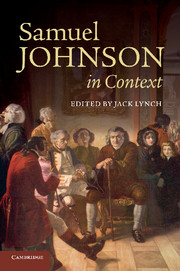Book contents
- Frontmatter
- Contents
- Illustrations
- Contributors
- Preface
- Chronology
- Abbreviations
- Part I Life and works
- Part II Critical fortunes
- Part III Contexts
- Chapter 10 America
- Chapter 11 Anglicanism
- Chapter 12 Anthropology
- Chapter 13 Authorship
- Chapter 14 Biography
- Chapter 15 Book trade
- Chapter 16 Clubs
- Chapter 17 Conversation
- Chapter 18 Dictionaries
- Chapter 19 Domestic life
- Chapter 20 Education
- Chapter 21 Empire
- Chapter 22 Essays
- Chapter 23 Fiction
- Chapter 24 History
- Chapter 25 Journalism
- Chapter 26 Law
- Chapter 27 Literary criticism
- Chapter 28 London
- Chapter 29 Medicine
- Chapter 30 Mental health
- Chapter 31 Money
- Chapter 32 Nationalism
- Chapter 33 Philosophy
- Chapter 34 Poetry
- Chapter 35 Politics
- Chapter 36 Scholarship
- Chapter 37 Science and technology
- Chapter 38 Scotland
- Chapter 39 Sermons
- Chapter 40 Shakespeare
- Chapter 41 Slavery and abolition
- Chapter 42 Social hierarchy
- Chapter 43 Theatre
- Chapter 44 Travel
- Chapter 45 Visual arts
- Chapter 46 War
- Chapter 47 Women writers
- Further reading
- Index
- References
Chapter 37 - Science and technology
from Part III - Contexts
Published online by Cambridge University Press: 05 June 2012
- Frontmatter
- Contents
- Illustrations
- Contributors
- Preface
- Chronology
- Abbreviations
- Part I Life and works
- Part II Critical fortunes
- Part III Contexts
- Chapter 10 America
- Chapter 11 Anglicanism
- Chapter 12 Anthropology
- Chapter 13 Authorship
- Chapter 14 Biography
- Chapter 15 Book trade
- Chapter 16 Clubs
- Chapter 17 Conversation
- Chapter 18 Dictionaries
- Chapter 19 Domestic life
- Chapter 20 Education
- Chapter 21 Empire
- Chapter 22 Essays
- Chapter 23 Fiction
- Chapter 24 History
- Chapter 25 Journalism
- Chapter 26 Law
- Chapter 27 Literary criticism
- Chapter 28 London
- Chapter 29 Medicine
- Chapter 30 Mental health
- Chapter 31 Money
- Chapter 32 Nationalism
- Chapter 33 Philosophy
- Chapter 34 Poetry
- Chapter 35 Politics
- Chapter 36 Scholarship
- Chapter 37 Science and technology
- Chapter 38 Scotland
- Chapter 39 Sermons
- Chapter 40 Shakespeare
- Chapter 41 Slavery and abolition
- Chapter 42 Social hierarchy
- Chapter 43 Theatre
- Chapter 44 Travel
- Chapter 45 Visual arts
- Chapter 46 War
- Chapter 47 Women writers
- Further reading
- Index
- References
Summary
SCI′ENCE. n.s. [science, French; scientia, Latin.]
1. Knowledge.
If we conceive God’s sight or science, before the creation of the world, to be extended to all and every part of the world, seeing every thing as it is, his prescience or foresight of any action of mine, or rather his science or sight, from all eternity, lays no necessity on any thing to come to pass, any more than my seeing the sun move hath to do in the moving of it. Hamm.
In July 1774, Johnson embarked on a tour of North Wales with his close friends, Henry and Hester Thrale. Johnson organized the first segment of the trip, and their first stop was his birthplace, Lichfield. While in Lichfield, the group visited apothecary Richard Greene’s museum of antiquities and natural curiosities; had lunch with one of the founding members of the Lunar Society, Erasmus Darwin; called on the “Swan of Lichfield,” the poet Anna Seward, Darwin’s friend and first biographer; and visited Andrew Newton’s collection of East Indian rarities. After an eventful three days, the group set out for an eleven-day stay with Johnson’s schoolmate and close friend, Dr. John Taylor. During their visit, they made excursions to view country seats (the Duke of Devonshire demonstrated his mechanical fountain for them), examined hot springs, explored underground rivers and caves, and inspected a silk mill, where Johnson “remarked a particular manner of propagating motion from a horizontal to a vertical wheel” (Works, 1:163–70). Add electricity and chemistry – made familiar to the Thrales by way of Johnson’s experiments in the laboratory they set up at Streatham – and these two weeks constitute a Grand Tour of eighteenth-century science and its practical applications.
Scientific developments
Their immersion in science and technology at Lichfield was far from coincidental: by the 1770s, Johnson’s birthplace had become a hotbed of experimentation and technological development. Situated in the English West Midlands just north of the industrial center of Birmingham, Lichfield emblematized the eighteenth-century drive to harness scientific knowledge for practical purposes. A group of the most important figures in “applied science” had gathered there and formed the Lunar Society: James Watt, inventor of the first commercially viable steam engine to power foundries and ironworks; silversmith Matthew Boulton, founder of the Soho Mint and manufacturer of Watt’s steam engine; potter Josiah Wedgwood, producer of the first bone china in Britain and inventor of the pyrometer (a thermometer used to measure extreme temperatures inside a kiln or furnace); clockmaker turned geologist John Whitehurst; natural philosopher and theologian Joseph Priestley, who wrote extensively on electricity, optics, theology, rhetoric, and, most famously, “dephlogisticated air,” now known as oxygen; Erasmus Darwin, physician, botanical poet, proponent of evolutionary theory, and grandfather of Charles Darwin; and physician William Withering, an amateur geologist, author of a botanical guide to British flora, and discoverer of digitalis, a medicine for the treatment of congestive heart failure. As the wide array of pursuits in this small group of men indicates, science had yet to fragment into the specialized disciplines we know today: chemists studied physics, mechanical engineers dabbled in mineralogy, and doctors were as likely to invent a device for predicting the weather as to discover a new medicine.
- Type
- Chapter
- Information
- Samuel Johnson in Context , pp. 320 - 328Publisher: Cambridge University PressPrint publication year: 2011



